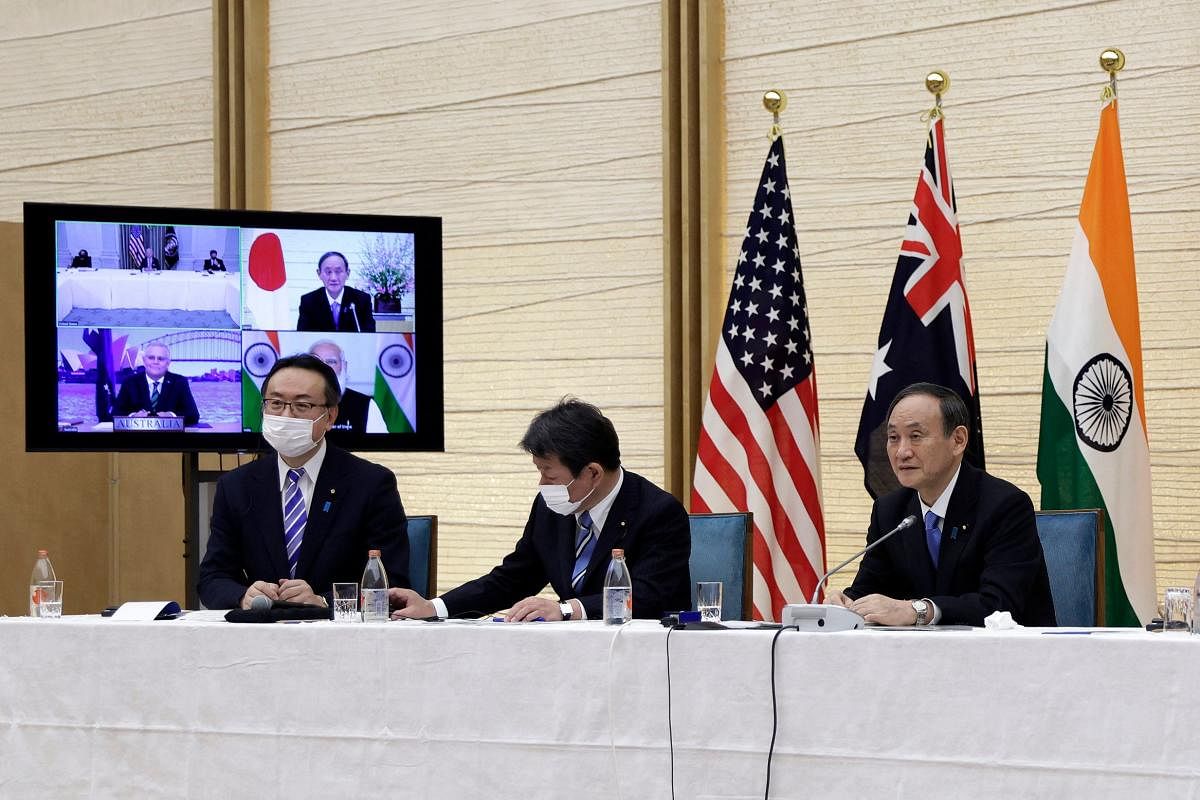
Several strands of strategic vectors may have been generated from the geostrategic moves signified by the first ever summit, albeit virtual, of the Quad leaders, Joe Biden, Narendra Modi, Yoshide Suga and Scott Morrison on March 12, 2020. In a first for the Quad, a joint statement was released that serves as a declaration broadly conveying the goals and areas of focus of the group. China is not mentioned and that silence is deafening.
Words are the tools of strategic communications and the Joint Statement seems to be particularly careful in downplaying the narrative that the Quad is purely a security-oriented grouping aimed at China. But the attempt is weakened because the locus of geographic space for cooperation is mainly the Indo-Pacific, which happens to be the area where geopolitical contestations are presently hinged. Modi’s tweet -- “Reiterated India’s commitment to a free, open and inclusive Indo-Pacific in line with our vision of SAGAR -- Security and Growth for All in the Region” -- is indicative that India does not want to paint Quad as an exclusive club. China is unlikely to be convinced.
One of China’s major political anxieties has always been that its strategic weakness -- the dearth of reliable partners -- would be exploited by its major adversary, the US, by building a partnership against it. China would view such a partnership as a collaboration aimed at slowing the growth of China’s power and triggering internal political, economic and social fault lines that may pose an existential threat to the Communist Party of China. The overriding requirement of the state of readiness to defend such a threat which can manifest in many forms, including a military one, has been China’s clarion call to its citizens and the party cadres for more than a decade. The tone of that call has been getting shriller and no longer attempts to hide the warning to its potential adversaries – “We are strong, do not mess with us.”
For China, attempts at wooing partners has been a specific area of focus, in which it has achieved a certain degree of success, especially during the ‘America First’ approach of the Trump years. Its primary partners in global geopolitics now include Russia, Pakistan, Turkey and North Korea. Iran’s current proximity to China may be weakened if Biden’s efforts to return to the nuclear deal succeeds. Many others, medium and small powers, are more or less held hostage through China’s economic clout. With a changed approach wrought by Biden, such powers, especially in the Indo-Pacific, may now perceive the possibility of an alternative if the Quad measures up to its promise with the approach it proposes to adopt.
The approach is interesting because the core group will flexibly incorporate other partners, depending on the issue being addressed. The main issues identified have the ability to flexibly group its partners to fulfil any intended cooperative purpose.
The Quad stands “committed to promoting a free, open rules-based order, rooted in international law, to advance security and prosperity and counter threats to both in the Indo-Pacific and beyond. We support the rule of law, freedom of navigation and overflight, peaceful resolution of disputes, democratic values, and territorial integrity.” It has also pledged “to respond to the most pressing global challenges of economic and health impacts of Covid-19, combat climate change, and address shared challenges, including in cyber space, critical technologies, counterterrorism, quality infrastructure investment, and humanitarian-assistance and disaster relief as well as maritime domains.”
For the sake of argument, China can be part of the climate change agenda and even theoretically partner the Quad for ensuring a free and open Indo-Pacific. It should be obvious that for the theoretical proposition to be realised, it will require the evaporation of mutual fears regarding the other party disturbing the freedom of trade routes in the Indo-Pacific. China’s seizure of island territories and artificial island-building is unlikely to be rolled back, so if China has to be included in a free and open Indo-Pacific initiative, it will require the acceptance of the changed territorial and maritime status quo. Such expectations are non-starters.
In essence, the core issue of the Quad as a cooperative venture for a free and open Indo-Pacific will remain, though supplemented by joint efforts with flexible geometry of partners in varied fields. It is not difficult to visualise that China’s strategic behaviour will be influenced as the Quad matures and evolves its combined capabilities. Efforts at driving a wedge between the Quad partners will be a major axis of China’s approach.
Finally, India and Australia have both overcome their reservations about the Quad. The turning point for India has been China’s territorial aggression in Ladakh. For Australia, it has been economic coercion. Japan and Australia, unlike India, have treaty obligations with the US. The change in India’s stance on the Quad could have repercussions for its other multilateral dialogue platforms in the form of Russia-India-China (RIC), Brazil-Russia-India-China- South Africa (BRICS) and the Shanghai Cooperation Organisation (SCO).
Delhi must be prepared for China unleashing its media to paint India in extremely negative terms. Politically, India must continue to preserve its strategic autonomy and be wary of being drawn into confrontations that are not within the ambit of mutual interest. Having taken the decision, there should be no turning back. India’s plunge into the hazy waters of the Quad is a significant foreign policy decision of the Modi government. It holds the promise of being a game-changer in global geopolitics that could possibly provide solutions to the problems arising from the growing anarchy in the international system. The reluctance to name China must not be viewed as pussyfooting. It is to be viewed as a diplomatic device that keeps open the doors of dialogue to resolve issues rather than depending on coercion to resolve what are essentially pervasive and perennial frictions generated by the human condition.
(The writer is Director, Strategic Studies Programme, Takshashila Institution, Bengaluru, and former Military Adviser, National Security Council Secretariat)